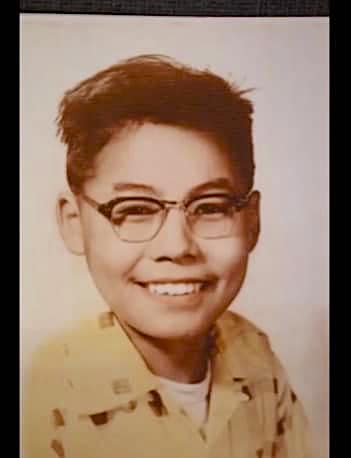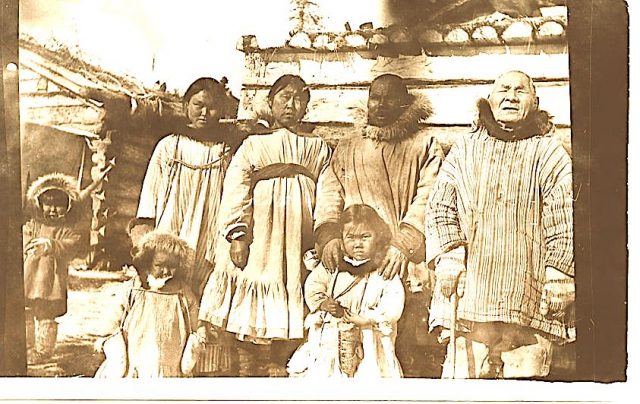BSNC Elder shareholder and Pulitzer Prize-winning writer John Tetpon’s life has been an incredible and unique journey from a childhood in our region to travels across Alaska and the Lower 48. We asked John to share some of his memories here, in his own words:
I was tempted. I wanted to suggest a little humor here.
I wanted to say, “It was a cold and stormy night” …or…“I was born a poor Native child,” but it would’ve been too cliché, so I decided I guess I’ll just tell it like it is, my little story.
I’ve been around a while. Eighty years. Been here and there, doing this and that, trying to survive sometimes, and Lord Almighty it’s been a ride. I’ve walked the hallowed halls of Yale University; watched the mayor of the City of San Diego get busted by the FBI in his office for fixing Yellow Cab fares for himself; had a murder suspect confess his crime to me on the record; chased a few big-time drug dealers around; and sat through some grisly murder trials in my time as a crime reporter for the Anchorage Daily News and Anchorage Times.
Even won a Pulitzer Prize. But that’s another story.
Those times are long gone now. Just memories. They sit around like bums on a street corner waiting for the liquor stores to open up.
I was born in Shaktoolik, just up the coast from Unalakleet in the winter of 1943. Ten years later, Grandma Kipo passed away and we left for Nome. Those were the finest and best times of my childhood. Fishing and hunting, picking berries — that’s what we did year-round. Happy days.
Grandma was our rock. And now she was gone. On the day she died, she asked Floyd and I to get her some fresh food, which meant ptarmigan or rabbit for stew. We set out on the tundra and bagged a couple of birds. Resting on a log, Floyd said, “Did you see that?” I looked toward Shaktoolik and watched as a beam of light come down from the sky, touch our house, and beam back up. “She died,” Floyd said.
We ran home. Grandma had passed away.
I never knew much of life outside that balloon. I don’t think I knew I was Native until someone told me in such a way that I have never forgotten it. And that was a shocker. Almost fatal. It was my first day of school at the Bureau of Indian Affairs one room schoolhouse and I was excited. “We’re going to learn how to read and write,” I said loudly in Inupiaq to my friends.
I was smiling. We were smiling and happy. All of us. That was until of a sudden, I felt the hand of the teacher grab me by the collar, lifting me up to his shoulder. I was terrified. I didn’t know what was happening and why. I was 6 years old.
I felt and saw his hand near my mouth with a bar of Fels Naphtha soap. The bar of soap was tan, almost brown in color. He shoved it into my mouth and down my throat, making soap bubbles come out of me. “Don’t speak Inupiaq in my school!” he yelled. I was in tears, choking. I couldn’t breathe.
I didn’t understand his words.
He dropped me to the floor. Shaking, I was on my hands and knees. I tried to get the bar of soap out of my mouth, but it was stuck. I was out of air. I was going to die right there. I tried again as hard as I could, and the bar of soap popped out. Shaking all over, I cried.
The teacher forced an older girl to translate what he had said. She was crying too. Sobbing. Scared to death. The room fell still. And quiet. Afraid. Terrorized.
I have never forgotten that day. Why, I ask. Why? For years I never uttered a word of Inupiaq — and forgot most of it.
Today I hunger to hear my language and my words, but they are elusive as butterflies in winter.
According to the National Congress of American Indians, “scholars project that without immediate and persistent action, only 20 Native languages will still be spoken by 2050.
“This crisis is the result of longstanding government policies — enacted particularly through boarding schools — that sought to break the chain of cultural transmission and destroy American Indian and Alaska Native cultures.
“Native language revitalization is a critical priority for Tribes because language goes to the heart of Tribal identity. A language is not simply a collection of words; nor is one language interchangeable with another. In many ways, language is culture.”
Below are three photos. At far left is me. I go by the name John Tetpon. The next one is me at age 11. The next photo is my Grandma Kipo. She is the third from far right. My mom Felicia was an infant and is asleep in Kipo’s parky. I don’t know who the others are.



